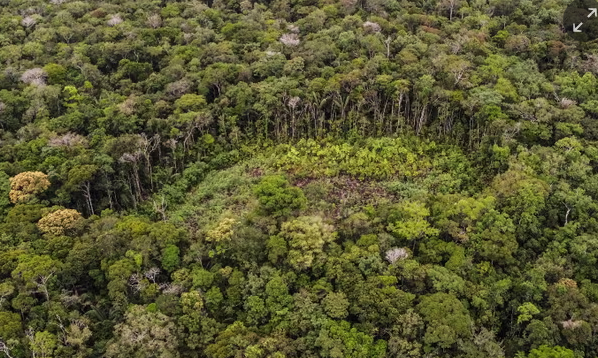May 30, 2025 | 07:31 GMT +7
May 30, 2025 | 07:31 GMT +7
Hotline: 0913.378.918
May 30, 2025 | 07:31 GMT +7
Hotline: 0913.378.918

Offsets generated by schemes protecting rainforests lost 62% of their value between 2022 and 2023. Photograph: Juan Pablo Pino/AFP.
The market for carbon offsets shrank dramatically last year, falling from $1.9bn (£1.5bn) in 2022 to $723m in 2023, a new report has found. The drop came after a series of scientific and media reports found many offsetting schemes do nothing to mitigate the climate crisis and biodiversity loss.
The research by Ecosystem Marketplace, a nonprofit initiative that collects data about the carbon market from brokers and traders, found the market had shrunk 61%.
It attributed the contraction to a flurry of scientific studies and media reports that concluded millions of offsets were “worthless”, with some projects linked to human rights concerns.
Each carbon credit is meant to represent the reduction or removal of one tonne of CO2 emissions removals or reductions, and they have been used by leading companies to label their products “carbon neutral”, or to tell consumers they can fly, buy new clothes or eat certain foods without making the climate and biodiversity crises worse.
Offsets generated by schemes protecting rainforests, the most popular type, lost 62% of their value between 2022 and 2023. These schemes were the focus of a joint investigation by the Guardian, which found more than 90% of rainforest carbon offsets from a large sample of projects from Verra – the world’s leading certifier – are worthless, and uncovered potential human rights abuses at a flagship project. Verra disputed the findings.
Julia Jones, a co-author on one of the studies in the investigation and a professor at Bangor University, said urgent reforms were necessary so carbon markets could work as intended.
“The media scrutiny revealing that many projects issuing Redd+ credits to the voluntary carbon market have sold more credits than justified is important,” she said.
“However, I am deeply concerned that some of the recent coverage of the issue gives the impression that the very idea of tackling climate change by slowing tropical deforestation is a scam – this is not true and the idea could harm forests.
“Dramatically more finance is urgently needed to stop the ongoing loss of forests and the vital services they provide – a reformed voluntary carbon market could play a key role in providing that finance,” she said.
On Tuesday, the White House held an event to support industry-led efforts to reform carbon markets, backing initiatives to help companies avoid greenwashing and ensure credits represent actual environmental impact.
The US treasury secretary, Janet Yellen, said companies should be prioritising cuts to emissions, but the Biden administration still wanted carbon credits “to succeed”.
The move comes amid deep divisions between environmental groups about the role of carbon credits in helping companies meet net zero targets.
Stephen Lezak, a programme manager at the Smith School of Enterprise and the Environment, University of Oxford, said people should not turn away from carbon markets.
“The current market for carbon offsets is a bit like a burning building. We need folks to be firefighters and run toward it, rather than walk away and let it burn to the ground. Limiting global warming to 1.5C simply isn’t feasible without having a functioning market for this sort of climate finance,” he said.
Kaya Axelsson, a research fellow at Oxford Net Zero, said: “This is a critical transition moment. Carbon markets will lose relevance unless they radically reform in line with net zero aims.”
Rene Velasquez, managing partner at the carbon markets consultancy Valitera, disputed the size of the fall reported by Ecosystem Marketplace and said there were problems with the methodology.
“As with previous years, their report is incomplete and relies on a survey of market participants to provide confidential trade data,” he said. “The reality is fewer and fewer institutional respondents participate. While I will concede the market retreated, this skews the numbers.”
(The Guardian)

(VAN) Vikas Rambal has quietly built a $5 billion business empire in manufacturing, property and solar, and catapulted onto the Rich List.

(VAN) Available cropland now at less than five percent, according to latest geospatial assessment from FAO and UNOSAT.

(VAN) Alt Carbon has raised $12 million in a seed round as it plans to scale its carbon dioxide removal work in the South Asian nation.

(VAN) Attempts to bring down the price of the Japanese staple have had little effect amid a cost-of-living crisis.

(VAN) Fourth most important food crop in peril as Latin America and Caribbean suffer from slow-onset climate disaster.

(VAN) Shifting market dynamics and the noise around new legislation has propelled Trouw Nutrition’s research around early life nutrition in poultry. Today, it continues to be a key area of research.

(VAN) India is concerned about its food security and the livelihoods of its farmers if more US food imports are allowed.